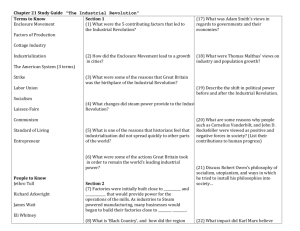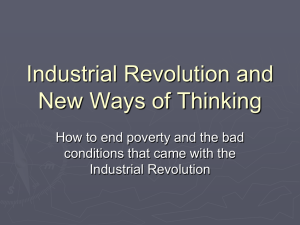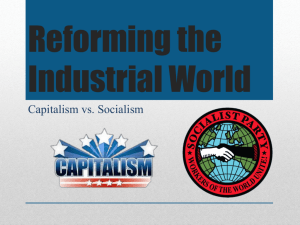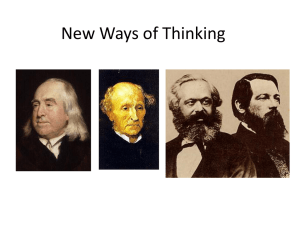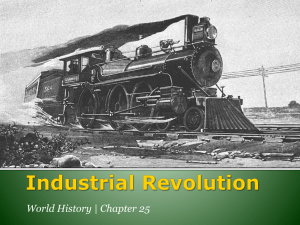File
advertisement
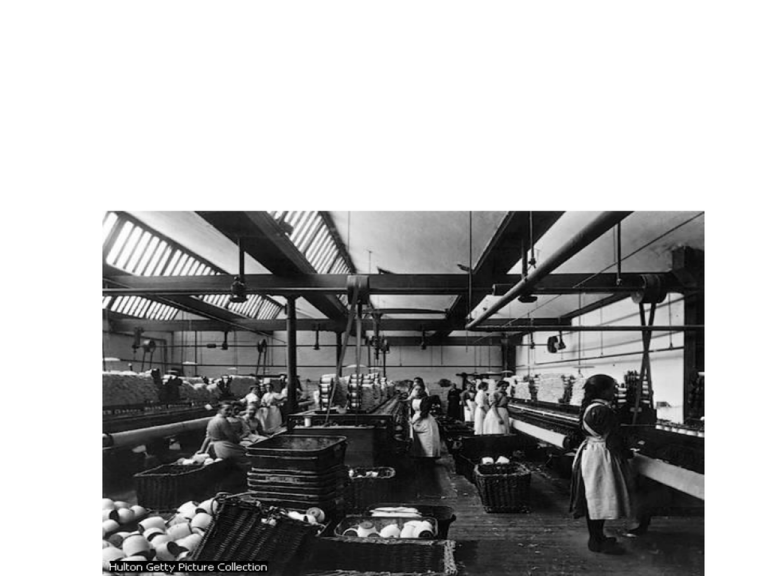
Henry Bessemer Volta Faraday Pasteur Industrial Revolution • Industrial Revolution, – widespread replacement of manual labor by machines that began in Britain in the 1700s. – Causes of the Industrial Revolution • New farming methods • New technology Ch. 5 Sec. 1 Dawn of the Industrial Age • Life before Industrialization – People lived in simple homes – Worked using hand tools – Light • Candles – Clothes • Made their own – Food • Grew their own – Traveled • by foot or horse – Communicate • Sent Messages or messenger • Life after industrialization • Towns turned to cities • Machines began to do work • Light » Electricity • Bought » clothes and food • Travel • boat or train • Communicate » telegram New Inventions • Anesthetic – Kills pain • Sewing machine • Tool to measure the speed of light • Antiseptic • Kills germs New Farming Methods • Lord Charles Townshend • Urged farmers to grow turnips, because it replenished the soil • Jethro Tull • Invented the Seed Drill – Helped farmers, because it planted seeds in a row New Technology • Energy – Coal • Used to power the steam engine • Thomas Newcomen – Invented the steam engine • James Watt – Improved Newcomen’s steam engine Steam Engine Reasons why Britain led the way in Industry Natural Resources Human Resources Technology Britain Takes The Lead Political Conditions Social Conditions Economic Conditions Ch. 3 Sec 2 Britain Leads the way Why did the Industrial Revolution begin in Britain? 1. Plenty of coal and iron 2. Large number of workers 3. Rapid population growth (5 mil to 9 mil in one year) 1. Why? 1. More food = less famine 2. More medicine = less sickness, disease 4. Entrepreneurs took risks to start new businesses 5. Increased Trade = more money Continued 6. Stable government (constitutional monarchy) 7. Strong navy 8. Britain was the center of the Scientific Revolution 9. Skilled mechanics The Age of Iron and Coal 10. Darby invented a new way to produce iron. 1. Coal replaced wood to smelt iron 1. Made iron cheaper, but better. Changes in the Textile Industry Cotton 11. New inventions improve the British textile (cloth) industry 1. Spinning jenny (spins cotton into cloth) 12. First factories are built 1. Machines were too large to be in homes 2. Factories were located near streams and railroads 1. transportation Spinning Jenny Early Factory Factory Later Factory Revolution in Transportation 9. Steam locomotive (train) 1. Faster and cheaper transport 10. Steamboats improved shipping 1. Faster and cheaper transport 1. Max speed was 5 mph Locomotive Steamboat Reviewing key terms 11. Abraham Darby 1. He produced better quality and less expensive iron 12. Richard Arkwright 1. Hard working entrepreneur who invented the waterframe to speed up spinning cotton. 13. Factory 1. Places that brought together workers and machines to produce large quantities of goods 14. Turnpike 1. Privately built roads that charge a fee to travelers who used them 15. Robert Fulton 1. American who used James Watt’s steam engine to power a boat that broke the speed record 1. 5 mph Britain Cotton Trade--1850 A. B. C. D. E. F. G. H. I. J. Industrial Revolution Pop Quiz 1. Name two differences between life before and life after industrialization. Before After Example: Communicate: messenger Example: Communicate: by telegram or telegraph 1. Travel: 1. Travel: 2. Work: 2. Work: 2. Give one Reason why Britain led the way in Industry Britain Takes The Lead Pop quiz continued 3. Why were factories built and why were they built near rivers and railroads? 4. What was the energy source that powered the steam engine? 5. Who invented the seed drill and how did it help farmers? 6. List the 2 factors that caused rapid population growth. A H I F G C J E D B Ch. 5 section 3 Hardships of Early Industrial life 1. What is a movement of people from the countryside to the city? P 178 2. What led to the massive migration of people from farms to cities? P 178 3. Who benefited most from the Industrial Revolution? P 179 4. What social class was created because of the Industrial Revolution? p179 5. Describe factory work during the beginning of the Industrial Revolution. p180 6. Describe the tenement. (Be specific) P 180 7. What did the Luddites protest against? P 180 8. Why did employers prefer to hire women over men? 181 9. If women were working in factories, who was cleaning the home, cooking, and taking care of the children? 181-182 10. Describe the conditions for Miners and factory workers? 181 11. What happened to workers who got sick or injured on the job? Why? 181 Test continued 12. Why were children hired to work in factories and coal mines? 13. Describe working conditions for children in the mines. 14. What were some benefits that the working class gained as the Industrial Revolution progressed? 1 5 6 4 7 2 3 Ch. 5 Section 4 New Ways of Thinking • California State Standard 10.3.6: Analyze the emergence of Capitalism, Socialism, and Communism. Ch 5 section 4 Vocabulary • Capitalism – Individuals own companies and are free to sell goods at a price in order to make a profit • This is the type of economy that the US has • Laissez-Faire – Hands-off policy in business. (operate without govt. interference) • Free Market – Businesses are allowed to charge any price they want. Vocabulary cont. • Socialism – Together, people own and operate the means of production. (businesses) • Communism – Last stage of socialism, where different social classes no longer exist and the people own businesses together. • Bourgeoisie – Middle class or business owners • Proletariat – Working class (factory workers, farm labor) Capitalist Communists Laissez-faire Economists Capitalists Adam Smith •Free Market competition would cause lower prices Thomas Malthus David Ricardo •Believed that population growth would cause the poor to suffer •Believed that the poor could improve their lives, if they had less children Adam Smith Ch. 3 Section 4 New Ways of Thinking • Adam Smith – He believed in laissez-faire economics – Laissez-Faire • “Hands off” policy (no govt. interference) • Free market (capitalism) would produce more goods at lower prices. – Do you agree? – If you have a lot of something, (pencils) do you think they would be expensive or in expensive? » inexpensive, because the pencil company would want to sell to get rid of them. Thomas Malthus Laissez-Faire • Thomas Malthus – Supported Laissez-Faire economics – Feared that population would increase, but that the food supply would not • If there’s not enough food, then people die. • Malthus also believed that WAR and Disease would decrease the population – Malthus’s solution to the increased population • Urged families to have fewer children – If not, then Poor families would suffer David Ricardo Laissez-Faire • David Ricardo – Supported laissez-faire – Agreed with Malthus that the poor had too many children – Theory • “iron law of wages” – If wages are high, families had more children • Problem – Children increased supply of labor, which caused lower wages and high unemployment Utilitarianism • Idea that the goal of society should be happiness for all Jeremy Bentham •Believed that laws Should provide more Pleasure than pain John Stuart Mill •Wanted the govt. to step in and improve the lives of the working class. Jeremy Bentham The Utilitarian • Jeremy Bentham – Believed in Utilitarianism; • Idea that the goal of society should be happiness for all – Believed that laws should provide more pleasure than pain • Do you agree? – He was ok with govt. interference as long as it helped those with problems John Stuart Mill Utilitarian • John Stuart Mill – Strongly believed in individual freedoms • Also ok with government interference – Wanted working class and women to vote – Against child labor Socialist Robert Owen Karl Marx •Utopian •All work should be shared and all property owned by the people •Believed there was a struggle between bourgeoisie and proletariat •Believed the Proletariat would win •Workers would control society and everyone would be equal Socialism • Socialism – People (public) own and operate businesses. • Main reason for socialism – Improve society and end the gap between the rich and the poor – Everyone would be equal – There would be no crime, no government, no disease, no sadness, no boredom Robert Owen The Utopians • Robert Owen – He was a Utopian • Believed that all work should be shared and all property owned by the people • No difference between the poor and rich • Fighting would stop • End child labor – He owned a factory and treated and paid his employees well Karl Marx Scientific Socialism • Karl Marx – Disagreed with the Utopians (unreal) – He saw the current problem as a class struggle between employers and employees • Employers were the “haves” – Bourgeoisie, or Middle class • Employees were the “have-nots” – Proletariat or working class – In the end, he believed the proletariat would win Karl Marx • Marx hated capitalism, because it caused happiness for a few and poverty for many • He supported Communism – Classless society where the people run and own everything equally Adam Smith 1. Who is a Socialist? David Ricardo Karl Marx John Stuart Mill Thomas Malthus Jeremy Bentham 2. Which two are Utilitarians? • • • • Karl Marx • John Stuart Mill Adam Smith • Thomas Malthus Robert Owen • David Ricardo Jeremy Bentham 7 3 4 1 3. Name the three people who supported laissez-faire economics. 2 6 5 4. Which two groups did Karl Marx believe were against each other and who did he believe would win? 5. What was today’s standard? 6. What was the goal of Utilitarianism? 7. Who believed that laws should bring pleasure and not pain? 8. Who believed that the poor could improve their lives if they had less children? 4. What is the difference between a conservative and a liberal? 5. What do you consider yourself to be, a conservative or liberal? Why? 6. Which of the following is a liberal? George W. Bush Mr. Dabbs Karl Marx

